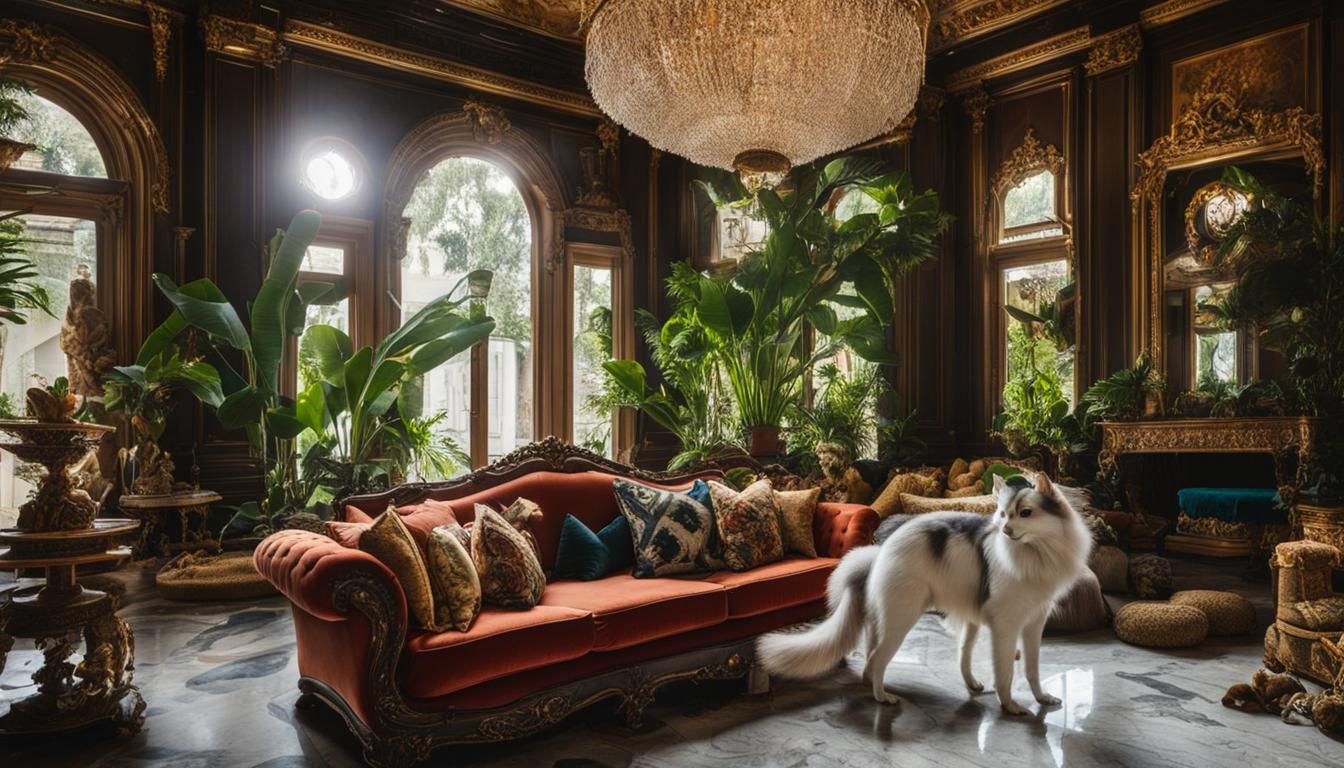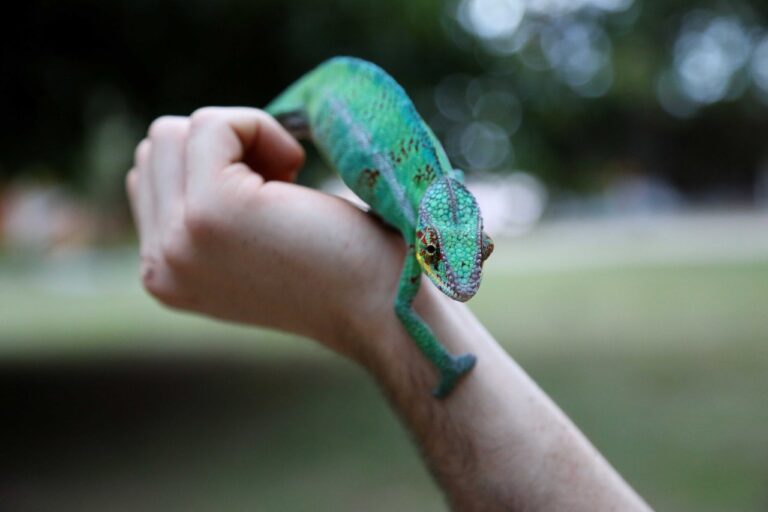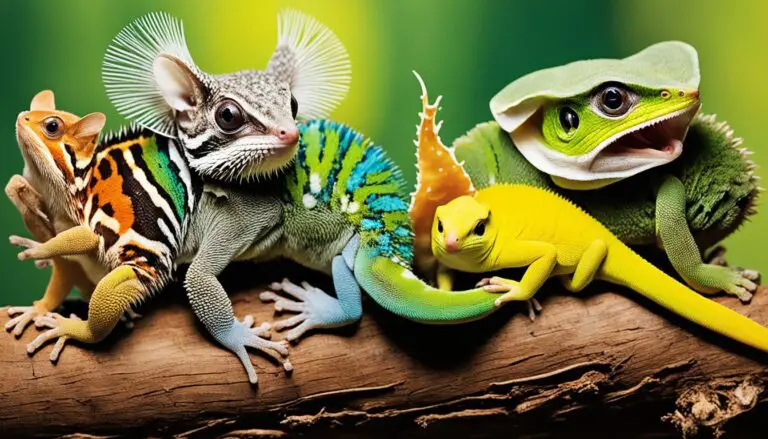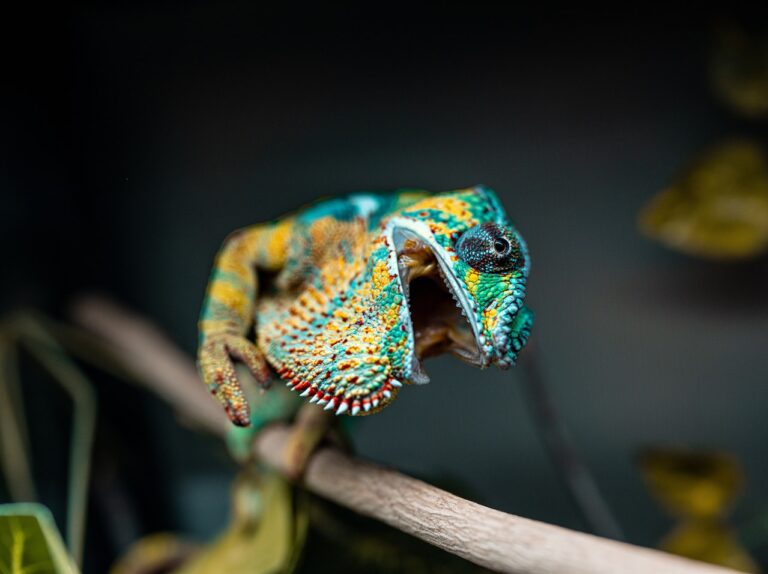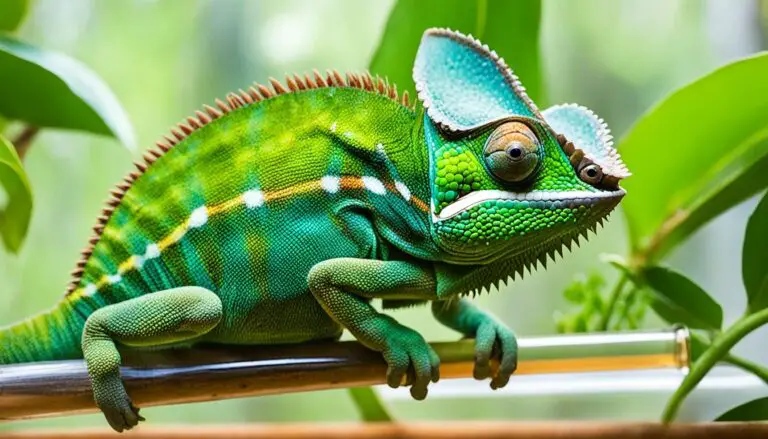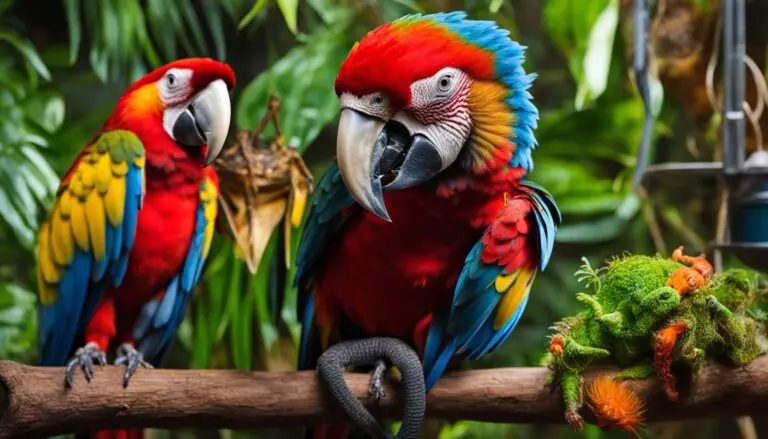Exotic Pet Care for Large Houses Tips
Taking care of exotic pets in large houses requires special considerations and unique approaches. These extraordinary creatures bring joy and companionship to their owners, but they also require specific care tailored to their needs. Whether you have a majestic parrot, a slithering snake, or an adorable sugar glider, providing the right environment and attention is crucial to ensure their well-being.
As the proud owner of an exotic pet, you understand the importance of their care and happiness. That’s why we’ve put together these essential tips for exotic pet care in large houses. From creating the perfect space to understanding their unique needs, we’ll guide you through the process of providing a comfortable and enriching environment for your beloved companion.
Key Takeaways:
- Exotic pets in large houses require special care and attention to thrive.
- Understanding the unique needs of your exotic pet is essential.
- Creating the right environment is crucial for their well-being.
- Providing essential amenities is important for their comfort.
- Implementing a daily care routine ensures their health and happiness.
Understanding Exotic Pet Needs in Spacious Homes
Exotic pets require special care and attention, especially in spacious homes where their unique needs must be met. To ensure the well-being and happiness of your exotic pet, it is important to identify their specific demands and create an environment suitable for their species. Additionally, providing essential amenities in large houses is crucial for the comfort and enrichment of these extraordinary companions.
Identifying the Unique Demands of Your Exotic Pet
Each exotic pet has distinct requirements that must be understood and catered to. Whether it’s temperature control, humidity levels, or specific dietary needs, taking the time to identify and address these demands is essential for their overall health. Consulting with a knowledgeable exotic pet specialist or veterinarian can provide valuable insights into the optimal care and well-being of your unique companion.
Creating The Right Environment for Various Species
Exotic pets come from diverse habitats and require an environment that mimics their natural surroundings as closely as possible. Factors such as temperature, lighting, and humidity must be carefully regulated to ensure their comfort and health. Providing appropriate habitats, such as enclosures or terrariums, with the necessary features and room for movement, is crucial in creating a nurturing environment for exotic pets in spacious homes.
Essential Exotic Pet Amenities in Large Houses
Large houses offer the opportunity to provide exotic pets with a range of amenities that cater to their unique needs. These amenities may include:
- Spacious and secure enclosures for their species
- Dedicated areas for exercise and play
- Enrichment toys and activities to stimulate their minds
- Heat lamps or UVB lights for pets that require additional warmth or light
- Proper filtration systems for aquatic pets
- Secured outdoor spaces for pets that need supervised outdoor time
These amenities not only contribute to the physical well-being of exotic pets but also promote their mental and emotional enrichment, ensuring a fulfilling life in their expansive homes.
Understanding and meeting the needs of exotic pets in spacious homes is crucial to their overall health and happiness. By identifying their unique demands, creating an appropriate environment, and providing essential amenities, you can ensure that your exotic pet thrives in their luxurious living space. Stay tuned for the next section, where we will explore designing pet-friendly spaces for large house amenities.
Designing Pet-Friendly Spaces for Large House Amenities
Caring for exotic pets in a large house involves more than just providing a spacious environment. It requires careful consideration of their unique needs and the customization of living areas to ensure their safety and comfort. By designing pet-friendly spaces with large house amenities, you can create a harmonious living environment for your exotic pets.
Customizing Living Areas for Exotic Pets
One of the key aspects of designing pet-friendly spaces is customizing living areas to cater to the specific requirements of exotic pets. Consider the following:
- Temperature and Humidity: Some exotic pets require specific temperature and humidity levels to thrive. Install appropriate heating, cooling, and humidity control systems to maintain a comfortable environment for them.
- Enclosures and Habitats: Provide enclosures or habitats that mimic the natural environment of your exotic pets. This could include branches or perches for birds, climbing structures for reptiles, or hiding spots for small mammals.
- Enrichment Activities: Create engaging and stimulating environments by incorporating toys, puzzles, or interactive features that cater to the natural behaviors of your exotic pets. This helps prevent boredom and promotes mental stimulation.
Integration of Exotic Pet Accommodations
In addition to customizing living areas, integrating special accommodations for exotic pets is essential for their well-being. Consider the following:
- Furniture and Surfaces: Choose pet-friendly furniture and surfaces that are easy to clean and resistant to scratches or damage, ensuring a safe and comfortable space for your exotic pets.
- Litter Boxes and Waste Disposal: Set up appropriate litter boxes or waste disposal systems that are suitable for each exotic pet’s needs. This helps maintain cleanliness and hygiene in the living areas.
- Feeding Stations: Designate specific feeding areas and provide appropriate feeding stations or bowls for each exotic pet. This helps prevent competition or aggression during meal times.
Ensuring Safety and Comfort for Your Unique Pets

Create a safe and comfortable environment for your unique pets by considering the following:
- Secure Enclosures: Ensure enclosures or designated areas are escape-proof and provide adequate protection for your exotic pets.
- Pet-Proofing: Identify potential hazards or dangers in the living areas and pet-proof them to prevent accidents or injuries. This includes securing electrical cords, removing toxic plants, and storing hazardous substances out of reach.
- Temperature Regulation: Monitor and maintain appropriate temperatures in different areas of your large house to ensure the comfort and well-being of your exotic pets.
By carefully designing pet-friendly spaces, customizing living areas, integrating exotic pet accommodations, and prioritizing safety and comfort, you can provide a thriving environment for your exotic pets in your large house. The next section will delve into implementing a daily care routine to further enhance their well-being.
Implementing a Daily Care Routine for Exotic Pets
Providing a daily care routine is crucial for the well-being of exotic pets. These unique creatures require special attention and a consistent routine to ensure their health and happiness. From feeding and grooming to exercise and mental stimulation, here are some essential elements to incorporate into your daily care routine for exotic pets:
- Feeding: Determine the dietary needs of your exotic pet and establish a regular feeding schedule. Consult with a veterinarian experienced in exotic pet care to ensure you are providing the appropriate diet.
- Grooming: Exotic pets may have specific grooming requirements. This can include regular brushing, nail trimming, and bathing. Research the specific grooming needs of your pet and follow a grooming routine accordingly.
- Exercise: Exotic pets need exercise to maintain their physical health and prevent boredom. Consider engaging them in interactive play sessions or providing them with toys and activities that stimulate their natural behaviors.
- Mental Stimulation: Keep your exotic pet’s mind active and engaged by introducing puzzle toys, enrichment activities, or training sessions. This helps prevent boredom and provides mental stimulation for a happy, healthy pet.
- Social Interaction: Exotic pets may require social interaction with their owners or other pets of the same species. Research the social needs of your particular pet and provide them with the appropriate opportunities to interact and socialize.
By implementing a daily care routine tailored to the needs of your exotic pet, you ensure that they receive the necessary care and attention they require. Remember to always consult with a veterinarian specializing in exotic pets for personalized advice and guidance.
Exotic Pet Care for Large Houses
When it comes to exotic pet care, providing specialized attention and care is crucial, especially in large houses. These spacious living environments offer unique opportunities to create luxury accommodations and meet the specific needs of exotic pets. By prioritizing their well-being, homeowners can ensure that their beloved pets thrive in their expansive homes.
One key aspect of exotic pet care in large houses is creating luxury accommodations. These include spacious and comfortable living areas that cater to the unique requirements of each pet. Whether it’s a custom-built habitat for a reptile or a multi-level enclosure for a primate, the aim is to provide a safe and stimulating environment that mimics their natural habitat.
Additionally, exotic pet care for homeowners in large houses involves considering the specific amenities required by these unique pets. Large houses offer ample space for incorporating specialized features such as indoor play areas, dedicated exercise zones, and temperature-controlled habitats. These amenities not only enhance the quality of life for exotic pets but also provide opportunities for them to engage in natural behaviors and activities.
In order to ensure the well-being of exotic pets in larger homes, it is important to provide specialized care that caters to their specific needs. This may involve consulting with veterinarians or exotic pet specialists who have experience in caring for these unique animals. These professionals can provide guidance on proper nutrition, enrichment activities, and healthcare routines that are tailored to the needs of exotic pets in larger houses.
To sum up, exotic pet care in large houses requires a thoughtful and tailored approach. By providing luxury accommodations, incorporating specialized amenities, and seeking professional advice, homeowners can ensure that their exotic pets receive the care and attention they deserve in their spacious living environments.
Nutritional Considerations for Exotic Pets
Nutritional considerations play a vital role in the health and well-being of exotic pets. Providing a balanced and appropriate diet is essential for ensuring their overall health and happiness. Understanding their dietary needs is the key to meeting their nutritional requirements.
Exotic pets have unique dietary needs that vary depending on the species. It is crucial to research and understand the specific nutritional requirements of your pet to provide them with the right food and supplements.
Here are some nutritional considerations for exotic pets:
- Consult with a veterinarian or a nutritionist who specializes in exotic pet care to determine the best diet for your pet.
- Provide a variety of fresh, high-quality fruits, vegetables, and protein sources that are suitable for your pet’s species.
- Avoid feeding your pet foods that are toxic to their species. Some common household foods can be harmful to exotic pets.
- Consider the natural feeding habits of your pet’s wild counterparts and try to replicate a similar diet as closely as possible.
- Ensure that the food provided is appropriate for the size and age of your pet, as their nutritional requirements may change over time.
- Monitor your pet’s weight and adjust their diet accordingly to prevent obesity or malnutrition.
Proper nutrition is crucial for the overall health and longevity of exotic pets. By understanding their dietary needs and providing a well-balanced diet, you can ensure that your exotic pet thrives in their large house environment.
Preventative Health Measures for Exotic Pets
Taking preventative health measures is crucial for the well-being of exotic pets. By implementing regular veterinary check-ups, monitoring and maintaining their overall health at home, and understanding their behavior and stress signals, you can ensure that your exotic pets thrive in a healthy and happy environment.
Regular Veterinary Check-ups for Exotic Animals
Regular veterinary check-ups are essential for the preventative care of exotic pets. Exotic animals have unique health needs that require specialized knowledge and expertise. A qualified veterinarian will conduct thorough examinations, provide necessary vaccinations, and address any potential health concerns. These check-ups help identify and prevent potential health issues before they become more serious problems.
Monitoring and Maintaining Exotic Pet Health at Home
In addition to regular veterinary check-ups, it is important to monitor and maintain your exotic pet’s health at home. Keep an eye on their appetite, behavior, and physical appearance. Establish a routine for feeding, exercise, and grooming to ensure their overall well-being. Regularly clean their living environment and provide them with appropriate enrichment activities to keep them mentally stimulated.
Understanding Exotic Pet Behavior and Stress Signals
To provide optimal care for your exotic pet, it is important to understand their behavior and recognize stress signals. Exotic pets may exhibit different behaviors and communication methods compared to traditional pets. By learning their body language and recognizing signs of stress, such as changes in eating or grooming habits, excessive vocalization, or aggression, you can take appropriate measures to address their needs and reduce stress levels.

Exotic Pet Enrichment: Keeping Your Pets Stimulated
Keeping exotic pets stimulated is vital for their mental and physical well-being. These unique animals require activities and toys that engage their senses and provide mental stimulation. By incorporating enrichment strategies into their daily routine, you can ensure that your exotic pets live happy, healthy, and fulfilling lives.
One way to stimulate your exotic pets is by providing a variety of enrichment activities. This can include puzzle toys, treat-dispensing toys, and interactive games that encourage problem-solving and engagement. These activities not only keep your pets entertained but also help prevent boredom and destructive behavior. Additionally, rotating their toys and introducing new ones periodically can enhance their curiosity and keep them mentally stimulated.
Another effective way to stimulate your exotic pets is through sensory enrichment. This can involve creating different textures and scents in their environment. Consider using natural materials like branches and leaves, as well as introducing safe and appropriate scents that mimic their natural habitat. By stimulating their senses, you can provide a more enriching experience for your pets.
Physical exercise is equally important for exotic pets’ stimulation. Allow them ample space to explore and play, both within their enclosure and in supervised areas outside. Encourage activities that mimic their natural behavior, such as climbing, digging, or exploring. This not only provides physical exercise but also mental stimulation as they engage with their surroundings.
Finally, interactive play with your exotic pets is crucial for their stimulation and socialization. Spend time bonding with your pets through gentle handling, training sessions, and interactive games. This not only strengthens your bond but also encourages mental and physical activity. Remember to always prioritize the safety and well-being of your pets during playtime.
Exotic pet enrichment is an ongoing process that requires creativity and dedication. By providing a stimulating environment and engaging activities, you can ensure that your exotic pets thrive in their large house setting. Remember to observe their behavior and adjust the enrichment strategies accordingly to meet their changing needs. With proper enrichment, your exotic pets will lead fulfilling and enriched lives.
Conclusion
Proper care and attention are essential for exotic pets in large houses. By understanding their unique needs, providing a suitable environment, and prioritizing their health and well-being, you can ensure that your exotic pets thrive in their spacious living environment.
Remember to always seek professional advice and stay updated on best practices for exotic pet care in large houses. Consulting with an experienced veterinarian who specializes in exotic pets can provide invaluable guidance and ensure that you are meeting the specific needs of your beloved animals.
Additionally, staying informed about the latest research and advancements in exotic pet care is crucial. As our understanding of these animals continues to evolve, new information and techniques are constantly emerging. Continuing education and staying up to date on the latest developments will help you provide the best care possible for your exotic pets.
In conclusion, providing a loving and nurturing environment for your exotic pets in a large house is a rewarding responsibility. With proper care, attention to their unique needs, and a commitment to their health and well-being, your exotic pets can thrive and bring joy to your home for many years to come.
Source Links
- https://www.boltonvet.com/tips-for-exotic-pet-care/
- https://www.batcopetsitting.com/guide-to-exotic-pet-sitting/
- https://www.housesitmatch.com/blog/daily-care-for-exotic-pets-your-guide/
Peter Stones is the founder of Exotic Pets Place, the leading online resource for exotic pet care information.
With over 10 years of hands-on exotic pet ownership experience, he is deeply passionate about sharing his expertise to help others properly care for their unusual pets.
When he's not writing extensively researched articles or connecting with fellow exotic pet enthusiasts worldwide, you can find Peter at home tending to his own beloved menagerie of exotic animals.

